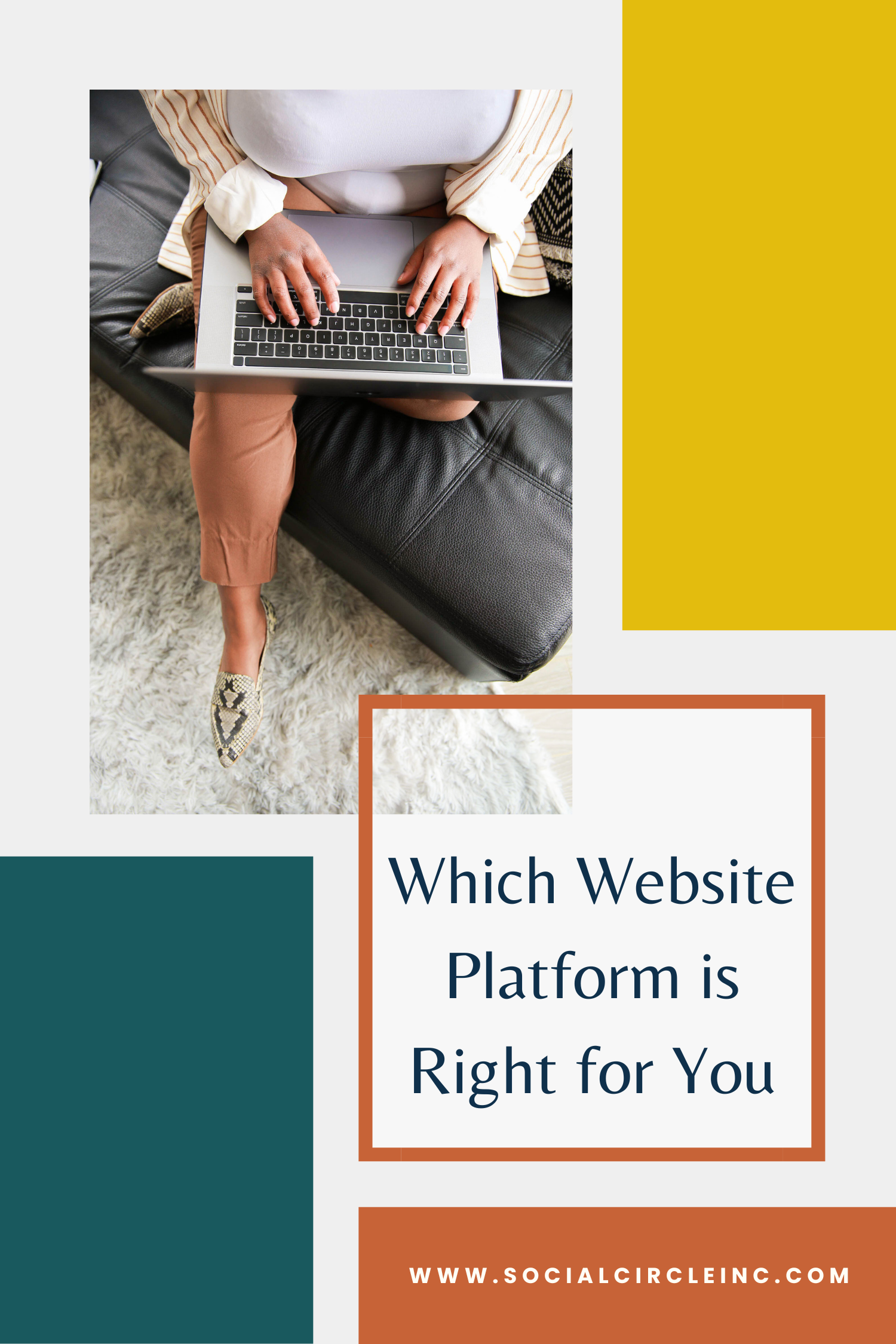Are you feeling overwhelmed by the endless options when it comes to website platforms? You’re not alone. It seems like every day there’s a new website platform being unveiled! With so many different platforms available, it can be difficult to determine which one is right for your business.
As a branding and web design agency, we’ve been around the block a few times and have had the opportunity to test drive many of the popular website platforms. That’s why we’re breaking down six of our favorite website platforms in this post: Squarespace, Showit, Shopify, Kajabi, Wix, WordPress, and Webflow.
Among these, some of the best free website builders like Wix and WordPress offer free versions with certain limitations, such as branding and resource allocations. A free website builder can be a great starting point for creating and launching professional websites quickly and easily without any prior experience. These builders often feature customizable templates and drag-and-drop tools, making them accessible and user-friendly for a wide audience.
We’ll provide insights into each platform’s pros and cons, along with ideal scenarios for using them. While each platform has its strengths and weaknesses, we know that there’s no one-size-fits-all solution. That’s why we work with each business owner to understand their design goals and recommend the platform that will work best for them.
You’ll learn about the unique features of each platform and be able to make an informed decision about which one is right for your business. We’ll provide a simple guide to help you choose the best website platform for your specific business needs. To ensure objectivity, we’ve listed the platforms in alphabetical order, so you can make the best decision without any bias. By the end of this post, you’ll be confident in your decision and ready to take your website to the next level.
–
Is Kajabi the right website builder for you?
Kajabi is a relatively new player in the web design game, but it’s quickly gaining traction as an all-in-one solution for course creators. If you’re a course creator looking for a one-stop shop that allows you to integrate lead magnets, sales pages, email CRM lists, and digital courses, Kajabi might be the perfect option for you. Kajabi also offers the option to use a custom domain, which can enhance your brand identity and provide better security and hosting services, though this typically involves additional costs.
One of the biggest advantages of Kajabi is its all-in-one platform. This means that everything you need to create and sell your courses is in one place, which can save you time and money in the long run. Additionally, Kajabi offers lead magnet integrations, sales pages, email CRM lists, and the ability to create digital courses all in one place.
However, Kajabi does have some downsides. For example, the design is template-based, which means you may have limited flexibility when it comes to creating a truly unique and personalized website. Additionally, the email integration only allows you to import basic data like first and last name, which may be limiting for businesses that require more robust email marketing capabilities. Finally, Kajabi is relatively pricey, with a monthly cost of $119 for the basic package.
Overall, Kajabi is an excellent option for course creators who are looking for an all-in-one solution to create and sell their courses. Its platform offers everything you need to create and sell your courses in one place. However, if you prioritize design flexibility or require more robust email marketing capabilities, you may want to consider other website builders that are better suited to your needs.
Kajabi Pros:
- All-in-one platform for course creators
- Offers lead magnet integrations, sales pages, email CRM lists, and digital courses
- Customizable templates to fit your branding
- Analytics dashboard to track course performance
- Integrates with a variety of third-party applications
Kajabi Cons: search engine optimization
- Pricey with a starting monthly cost of $119 for the basic package
- Email integration only allows you to import basic data like first and last name
- Template-based design can be limiting for businesses that prioritize design flexibility
We Recommend Kajabi for: Course creators and online educators who are looking for an all-in-one platform to create and sell their courses. Kajabi is especially useful for businesses that need a complete platform to manage their course content, marketing, and sales. Additionally, Kajabi offers customizable templates to fit your branding and integrations with a variety of third-party applications. However, Kajabi is not the best option for businesses that prioritize design flexibility or for those on a tight budget, as it is relatively expensive compared to other website builders.
–
Is Shopify the Right Website Platform For You?
Shopify is a website platform that’s designed specifically for e-commerce businesses. It’s widely regarded as the best website platform for selling products online and is used by many big brands. If you have a business with over 1,000 products or a monthly subscription “box-of-the-month” business, Shopify is a must.
One of the biggest advantages of Shopify is its e-commerce capabilities. The platform is designed specifically for selling products online and offers a wide range of features to make it easy to manage your online store. Additionally, Shopify provides reliable and secure web hosting, ensuring your site performs well and remains secure. Shopify is used by many big brands, which gives it a reputable reputation in the e-commerce industry.
Shopify also offers a multitude of plugins that can be added to improve the functionality of your Shopify site. This means you can customize your store to meet your specific business needs and goals.
However, Shopify does have some downsides. For example, it can be difficult to update as you need to know Shopify’s liquid coding language. This means you’ll likely need to invest in a website maintenance plan for updates, unless you plan on learning some code. Additionally, Shopify lacks some of the design functionality available on other websites, which means it may not be the best choice for businesses that prioritize design over e-commerce functionality.
Overall, Shopify is an excellent choice for businesses that prioritize e-commerce functionality. Its wide range of features and plugins make it easy to manage your online store, and its reputation in the industry gives it added credibility. However, if you’re a smaller store looking to prioritize design, we recommend Squarespace Commerce instead.
Shopify Pros:
- Superior e-commerce platform for businesses with over 1,000 products
- Trusted by big brands and has a great reputation
- Wide range of third-party integrations available
- Responsive and mobile-friendly design
- Offers advanced inventory management and order tracking capabilities
Shopify Cons:
- Can be difficult to update if you are not familiar with Shopify’s coding language
- Lacks some of the design functionality available on other platforms
- Can be more expensive than other website builders, especially for larger businesses
We Recommend Shopify for: web hosting
E-commerce businesses, especially those with large product catalogs or monthly subscription “box-of-the-month” businesses. Shopify is ideal for businesses that prioritize e-commerce functionality, with advanced inventory management and order tracking capabilities. It is also a great option for businesses that need to integrate with third-party applications and services, as Shopify offers a wide range of integrations. However, businesses that prioritize design flexibility or have limited budgets may want to consider other website builders that are better suited to their needs.
Is Showit the right website platform for you?
Showit is a website builder that’s known for its flexibility and design capabilities. Unlike template-based website builders like Kajabi and Wix, Showit allows users to create dynamic designs without needing extensive coding knowledge. This makes it an ideal option for creative industries, such as art, design, music, and event planning, as well as small business owners who are passionate about design.
One of the biggest advantages of Showit is its design flexibility. The platform’s drag-and-drop interface makes it easy to create and customize pages, assuming you have some basic graphic design skills. Showit’s user interface enhances the design experience by providing a seamless and intuitive way to build and modify layouts. Showit also allows users to create dynamic designs without coding, which means you can create a truly unique and personalized website.
Another advantage of Showit is its integration with WordPress. This is especially important for businesses that rely heavily on blogging or content marketing to drive traffic to their website. By integrating with WordPress, Showit allows users to create a dynamic blog that’s easy to manage and update.
For e-commerce businesses, Showit offers the ability to add Shopify Lite, which gives users the best of both worlds when it comes to e-commerce and website design.
However, Showit does have some downsides. For example, adding features like a WordPress blog or Shopify can significantly raise the monthly hosting cost. Additionally, designing for mobile must be done separately, which can make Showit more time-consuming to use.
Overall, Showit is an excellent website builder for businesses that prioritize design and creativity. It’s a great option for creative industries and businesses that want a truly unique and personalized website. However, if you’re looking for a more affordable option or don’t have a strong focus on design, you may want to consider other website builders that are better suited to your needs.
Showit Pros: user interface design
- Highly customizable designs for a unique website
- Offers dynamic designs without coding ability
- Integrates with WordPress, great for blogging
- Allows you to add Shopify Lite, giving you the best of both worlds for e-commerce businesses
- Provides a dedicated mobile design experience
Showit Cons:
- Added features like a WordPress blog or Shopify can raise the monthly hosting cost significantly
- Mobile design must be done separately which often makes Showit more time-consuming to use
- Design flexibility can be overwhelming for those without design experience
We Recommend Showit for:
Creative industries such as art, design, music, and event planning, small business owners obsessed with design, and solopreneurs who do extensive blogging or podcasting. Showit is ideal for businesses that prioritize unique, highly customized designs that stand out from the crowd. It is also a great option for businesses that want to integrate with WordPress or Shopify Lite, or for those who need a dedicated mobile design experience. However, businesses that have limited design experience or limited budgets may want to consider other website builders that are better suited to their needs.

–
Is Squarespace the right website platform for you?
Squarespace is a website builder that’s known for its user-friendly interface, modern design templates, and built-in features that make it easy to create a professional-looking website. It’s a great option for service-based solopreneurs and boutique owners who want to establish an online presence quickly and easily.
One of the biggest advantages of Squarespace is its ease of use. The platform’s drag-and-drop interface makes it easy to create and customize pages without any coding experience. Additionally, Squarespace offers built-in email CRM and appointment scheduling through Acuity, which can save businesses time and money. Squarespace also allows users to create a free website with its affordable plans, making it accessible for those who want to start without a significant investment.
Squarespace is also affordable for most small businesses, with plans starting as low as $12 per month. And, if you choose an annual subscription, you’ll receive a free domain name and Gsuite account with a branded email address, which can help establish a professional online presence.
While Squarespace has many advantages, it does have some downsides. For example, its blogging capabilities are limited compared to other platforms, such as WordPress. This makes it less suitable for businesses that rely heavily on content marketing or blogging as a way to drive traffic to their website.
In addition, while Squarespace’s SEO capabilities have improved, they’re still not as robust as other platforms. This means businesses that rely heavily on search engine optimization may not see the same results with Squarespace as they would with other platforms.
Overall, Squarespace is an amazing website platform to start from, especially for service-based entrepreneurs and boutique owners with under 100 products. Its ease of use, built-in features, and affordability make it an attractive option for businesses that want to establish an online presence quickly and easily. However, if you’re a heavy blogger or rely heavily on SEO, you may want to consider other platforms that are better suited to your needs.
Although Squarespace is user-friendly, creating a high-converting website involves much more than a pretty design. During our web design service, The Design Suite, we’ll work with you to create not only a beautifully designed website, but also a strategically designed website that highlights your unique brand, generates leads, increases sales, and allows you to show up with confidence.
Squarespace Pros:
- Easy to use and edit with a user-friendly interface
- Provides a built-in email CRM system
- Offers Acuity for appointment scheduling
- Reasonably priced for most businesses, no matter how small
- Provides support for memberships and courses
- Offers new annual subscriptions that include a free domain name and Gsuite account with a branded email address
Squarespace Cons:
- Blog functionality not as robust as WordPress (wouldn’t recommend for heavy bloggers)
- SEO not as robust as it could be, though it is improving
- Limited e-commerce functionality compared to some other platforms
We Recommend Squarespace for:
Service-based entrepreneurs and boutique owners with under 100 products. Squarespace is ideal for businesses that prioritize ease of use and a user-friendly interface, as well as for those who need built-in email CRM and appointment scheduling functionality. It is also a great option for businesses that offer memberships or courses, or for those on a budget. However, businesses that prioritize robust e-commerce functionality or heavy blogging may want to consider other website builders that are better suited to their needs.
Unlock the Branding Strategies of Billion Dollar Brands: Free Brand Strategy Course
Discover the exact process we use to craft breakthrough brands for our clients. Gain valuable insights from our founder, who has extensive experience working with industry giants like Nike, Disney, Hoka, and Coach.
Is Webflow the Right Website Platform For You?
Webflow is a website platform that offers a unique blend of design flexibility and code-based control. It’s a great option for designers, developers, and creative agencies who want complete control over their website’s design and functionality.
One of the biggest advantages of Webflow is its design flexibility. With Webflow, you can create completely custom designs that are tailored to your business’s needs and goals. Additionally, Webflow’s user interface design capabilities contribute significantly to creating unique and engaging websites.
Webflow offers a range of advanced features, such as custom animations and interactions, that can help your website stand out from the competition.
Another advantage of Webflow is its code-based control. With Webflow, you have complete control over the website’s code, which means you can create complex functionality and integrations that aren’t possible with other website platforms. Additionally, Webflow is a great option for businesses that want to integrate their website with other third-party tools and services.
However, Webflow does have some downsides. For example, the platform is more difficult to use than other website builders, and it requires some coding knowledge to take advantage of all its features. Additionally, Webflow can be more expensive than other website builders, which means it may not be the best option for businesses that are on a tight budget.
Overall, Webflow is an excellent option for designers, developers, and creative agencies who want complete control over their website’s design and functionality. Its design flexibility and code-based control make it an ideal choice for businesses that want a website that stands out from the competition. However, if you’re looking for an easy-to-use website platform or you’re on a tight budget, you may want to consider other options.
Webflow Pros:
- High level of design flexibility and customization options
- Built-in CMS with advanced content management features
- Powerful e-commerce functionality with integrations to popular payment gateways
- Offers advanced SEO optimization features
- Built-in hosting with automatic backups and security updates
- Ability to export code for developers who want full control over their website
- Strong community support and extensive resources available for learning
Webflow Cons:
- Steep learning curve, not as user-friendly for beginners
- More expensive compared to other website builders, especially for e-commerce
- Limited third-party integrations compared to other website builders
- Limited customer support options, mainly community forums and email support
We Recommend Webflow for:
Businesses and individuals who prioritize design and want a highly customized and unique website. Webflow is also ideal for businesses that need advanced e-commerce functionality or have complex content management needs. However, it may not be the best fit for those on a tight budget or with limited technical knowledge. If you want to use Webflow for e-commerce, keep in mind that the pricing can be significantly higher than other platforms like Shopify or WooCommerce. Overall, Webflow is a great option for those who are willing to invest the time and money into creating a high-quality, visually stunning website.
Is Wix The Right Platform For You?
Wix is a website platform that’s widely regarded as one of the most popular options available. It’s known for its ease of use, affordable pricing, and wide range of features. Whether you’re a small business owner or a solopreneur, Wix is a great option to consider for your website.
One of the biggest advantages of Wix is its ease of use. The platform offers a drag-and-drop interface, which makes it easy for anyone to create their own website without any coding knowledge. Additionally, Wix is affordable for most businesses, no matter how small, which means you can create a professional-looking website without breaking the bank.
Wix also offers a wide range of features to make it easy to manage your website. For example, Wix has built-in SEO capabilities, which means you can optimize your website for search engines without having to hire a separate SEO expert. Additionally, Wix offers a variety of templates to choose from, which means you can find one that suits your business’s needs and goals.
However, Wix does have some downsides. For example, the design capabilities are somewhat limited compared to other website platforms like Showit. Additionally, Wix is not the best option for businesses that prioritize blogging, as its blogging capabilities are somewhat limited.
Overall, Wix is an excellent option for small business owners and solopreneurs who are looking for an affordable, easy-to-use website platform. Its wide range of features and affordable pricing make it easy to manage your website without breaking the bank. However, if you prioritize design flexibility or extensive blogging capabilities, you may want to consider other website builders that are better suited to your needs.
Wix Pros:
- Easy to use drag-and-drop interface
- Affordable pricing plans
- Built-in SEO capabilities
- Wide range of templates to choose from
- App store with a variety of third-party integrations available
Wix Cons:
- Limited design capabilities compared to other website platforms
- Limited blogging capabilities
- Not ideal for businesses with more than 100 products
We Recommend Wix for:
Small business owners, solopreneurs, and freelancers who are looking for an affordable and easy-to-use website platform. Additionally, Wix is a good option for businesses that prioritize SEO, as it has built-in capabilities for optimizing your website for search engines. However, businesses that prioritize design flexibility or extensive blogging capabilities may want to consider other website builders that are better suited to their needs.

Is WordPress The Right Platform For You?
WordPress is a website platform that’s widely regarded as the gold standard for flexibility, customization, and advanced functionality. Whether you’re a large business or a solopreneur, WordPress is a great option to consider for your website.
One of the biggest advantages of WordPress is its high level of customization. The platform offers thousands of templates and plugins, which means you can create a website that’s tailored to your business’s unique needs and goals. Additionally, WordPress offers superior blogging functionality with a built-in content management system (CMS), which makes it easy to create and manage blog posts. WordPress also allows for extensive management of web content through its CMS, making it a powerful tool for organizing and structuring your website’s information.
WordPress is also highly SEO-friendly, with many powerful optimization plugins available to help you improve your website’s search engine rankings. Additionally, WordPress offers advanced e-commerce functionality with plugins like WooCommerce, which means you can create a fully functional online store that’s integrated with your website.
However, WordPress does have some downsides. For example, it can be difficult for beginners to use and customize, and it requires some technical knowledge and experience to set up and maintain. Additionally, some plugins can be expensive or not well-maintained, and security vulnerabilities can occur if not kept up-to-date.
Overall, WordPress is an excellent option for businesses that prioritize flexibility, customization, and advanced functionality. Its robust e-commerce functionality and superior blogging capabilities make it ideal for businesses that need those features. However, businesses that have limited technical knowledge or experience may want to consider other website builders that are easier to use and more affordable.
WordPress Pros:
- Highly customizable with a wide range of templates and plugins available
- Superior blogging functionality with a built-in CMS
- SEO-friendly with powerful optimization plugins available
- Offers advanced e-commerce functionality with plugins like WooCommerce
- Completely open source, so you can edit and modify the code to your liking
WordPress Cons:
- Can be difficult for beginners to use and customize
- Requires some technical knowledge and experience to set up and maintain
- Some plugins can be expensive or not well-maintained
- Security vulnerabilities can occur if not kept up-to-date
We Recommend WordPress for:
Businesses that prioritize flexibility, customization, and advanced functionality. WordPress is ideal for businesses that need robust e-commerce functionality or extensive blogging capabilities. It is also a great option for businesses that prioritize SEO, as there are many powerful optimization plugins available. However, businesses that have limited technical knowledge or experience, or that are on a limited budget, may want to consider other website builders that are easier to use and more affordable.
Website Platforms We Don’t Recommend:
While there are many website builders available, not all of them are suitable for serious business owners. GoDaddy Website Builder and Weebly, for example, lack the advanced functionality that growing businesses will eventually require. While these platforms may be suitable for hobbyists or small businesses with basic needs, they are not recommended for businesses that require robust e-commerce functionality, advanced blogging capabilities, or highly customizable designs. Serious business owners are likely to outgrow these platforms quickly, and may find themselves limited in terms of their ability to expand and grow their online presence. Such a site may not meet the needs of serious business owners due to its limitations.
Similarly, highly technical platforms like Drupal and Joomla may not be the best choice for many business owners. While these platforms offer a high level of customization and functionality, they require a significant amount of technical knowledge and experience to set up and maintain. This can be a significant barrier for many business owners, who may not have the time, resources, or expertise to manage these platforms effectively. As a result, many businesses may find it more practical to choose a more user-friendly website builder that can meet their needs without requiring extensive technical expertise.
Still confused about which website platform to choose?
Picking the right website platform is a big decision. Which is why I typically will not recommend a website platform until I have an understanding of the specific functionality needed for a website but here’s a few things to consider: –
It’s crucial to consider web page design and functionality, ensuring that the platform supports responsive design and allows web designers to create visually appealing and user-friendly web pages that maintain accessibility.
For starters, you need to figure out what you need in a website platform.
If you’re a freelance copywriter looking to build your online presence, you might opt for Squarespace. Working with a web designer can help you achieve a professional and effective website by ensuring the visual aspects such as layout, colors, and typography are well-executed. But, if you also want amazing blogging capabilities, Showit could be a better choice.
For larger e-commerce brands, Shopify is the ultimate website platform for you. But if you’re a smaller boutique with less than 1,000 products for sale, Squarespace or Showit can also work. Online courses are blowing up recently and if you’re ready to launch your first productivity course, definitely check out Kajabi.

Next, you’ll want to consider your budget.
Although it’s always a good idea to invest in your digital presence, knowing how much you’re able to spend is an important consideration. Squarespace is likely going to be your most affordable option but incorporating helpful add-ons can rack up the prices. Hiring professional web designers can also significantly impact your budget, as their expertise in layout, color, typography, and user experience often comes at a premium.
At the end of the day, you get what you pay for and sometimes it’s well worth it for an all-in-one solution. However, if you have any coding skills or an eye for design, you can save a bit of money here and there by opting for a more DIY approach.
Finally, you’re ready to build your website.
Choosing the right website platform can be a daunting task, but it’s an important decision that can impact the success of your online presence. At our branding and web design agency, Social Circle we specialize in helping businesses select the website platform that best fits their unique needs and goals. With our expertise and experience, we can guide you in making the right decision and achieving your online objectives.
Our signature web design service includes an in-depth website strategy session where we’ll work closely with you to understand your business objectives and recommend the best website platform, email platform, and other technical integrations necessary to achieve your goals. We believe that a website is not just a visual representation of your brand, but a powerful tool to help you grow your business. That’s why we take the time to truly understand your business needs and recommend the website platform that’s perfect for you. Additionally, we emphasize the importance of web accessibility in the website building process to ensure usability for all users and to boost your SEO.
Don’t let the process of choosing a website platform overwhelm you. Let us help you create a website that not only looks great, but also helps you achieve your business objectives. Visit our services page to learn more and book your discovery call today.
FAQ’s
What are some popular website platforms for small businesses?
Some popular website platforms include Squarespace, Showit, Shopify, Kajabi, Wix, WordPress, and Webflow. Each has its strengths and is suited for different types of businesses.
Which website platform is best for selling products online?
Shopify is widely regarded as the best platform for e-commerce businesses, especially those with large product catalogs or subscription services.
Can I create a website without coding knowledge?
Yes, platforms like Wix, Squarespace, and Showit offer drag-and-drop interfaces that allow you to create a website without any coding experience.
What is a good website platform for course creators?
Kajabi is an excellent all-in-one platform for course creators. It offers tools to manage courses, sales pages, email lists, and more.
Which platform should I choose if I need a highly customizable website?
Webflow offers a high level of design flexibility and control, making it a great choice for businesses that want a unique and customized website. However, it does require some coding knowledge.
–
–

